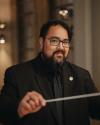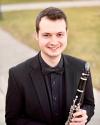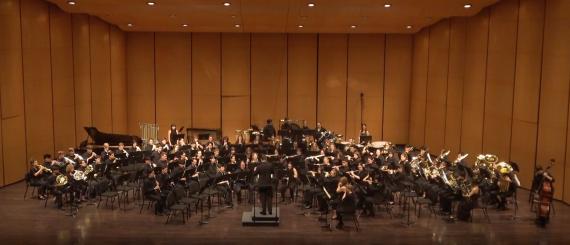The Campus Band (Solomon Encina, conductor) and Concert Band (David Stewart, Yuman Wu, conductor) present "Colors in Motion," a program of music by Malcom Arnold, Brian Balmages, Todd Starlter, Frank Erickson, John Barnes Chance, and others.
Program
University of Washington Campus Band
Solomon Encina, director
Ignition (2011): Todd Stalter (b. 1966)
Air For Band (1956): Frank Erickson (1923 - 1996)
To A New Dawn (2000): Philip Sparke (b. 1951)
University of Washington Saxophone Quartet
Quatuor Pour Saxophones (1949): Faustin Jeanjean (1900-1979) and Maurice Jeanjean (1897-1968)
III. Papillons (Scherzo)
IV. Concert Sur La Place (Humoristique)
Super Smash Bros. Brawl - Main Theme (2008): Nobuo Uematsu (b. 1959) arr. Chinmay Murthy (b. 2004)
University of Washington Concert Band
David Stewart, Yuman Wu, directors
Prelude, Siciliano and Rondo (1963/1979): Malcolm Arnold (1921-2006) trans. John P. Painter (1928-1996)
I. Prelude
II. Siciliano
III. Rondo
Rippling Watercolors (2015) : Brian Balmages (b. 1975)
Incantation and Dance (1963): John Barnes Chance (1932-1972)
PROGRAM NOTES
Ignition is a blindingly fast, raucously energetic concert opener that derives its title from the consecutive rising three-note cells that are the building blocks for the work. However, the energy unleashed in the music and the imagery of the title serve both as a metaphor for the “spark” of creativity, and as a “celebration in sound” for those who find and follow their own true life’s passion and pass it along to others, “igniting” the flame for another generation. (program note from publisher)
One of the stronger tendencies of twentieth century music has been a return to certain aspects of music of the Baroque and Classical periods. Compositions falling into this category are referred to as “neo classic.” Air for Band is such a piece. The form (binary) was quite common in the Baroque period and the melody and harmonies were strongly influenced by the works of Bach. (program note from score)
To A New Dawn was commissioned by the United States Continental Army Band, Captain Timothy J. Holtan, Commander and Conductor. The brief was for a piece to celebrate the 3rd Millennium, and it was the composer’s aim to provide a work which, as well as looking forward to the challenges of the new century, also contained moments of reflection about the last one. After a bright introduction featuring the trumpets, a perky theme, passing quickly through several keys, appears on the woodwinds. A solo trumpet takes up a new theme over bubbling quavers (eighth notes) and this leads to a rhythmic figure on low clarinets, followed by the upper woodwinds. A brass interlude follows and, after a short bridge passage, an oboe takes up a contrasting legato tune that builds to a climax. An andante section follows with solos for horn and flugel horn (or trumpet) and a florid flute cadenza. A passionate climax leads back to the faster music and, eventually to a full recapitulation, revisiting the earlier material before a lively coda close the work as it began. (program note from publisher)
While relatively minor composers overall, Faustin and Maurice Jeanjean’s Quatuor Pour Saxophones has nonetheless established a place in the foundational saxophone quartet repertoire. Like numerous other important works for the genre, it was written for the Quatuor de la Garde Republicaine, the saxophone section from France’s premier military wind ensemble. The quartet, first established by saxophonist Marcel Mule in 1927, would proceed to cement the saxophone’s place in the chamber music medium. Finished by Faustin JeanJean in 1949, thirteen years after Mule had left the Garde Republicaine, this quartet consists of four programmatic movements, two of which will be presented here. Papillons is an intense composition full of tension and dramatic shifts in style in a cascading triple-meter. Concert sur la place (Concert on the Square) is a humorous finale set in a lively duple-meter, featuring short solo interjections from each voice.
The main theme from Super Smash Bros. Brawl, originally composed by Nobuo Uematsu, is a powerful, cinematic piece that has become an iconic part of the gaming world. Written for the 2008 release of Super Smash Bros. Brawl on the Nintendo Wii, the theme combines Latin choral lyrics, intense orchestration, and a dramatic melody to set the tone for the game’s epic battles. This saxophone quartet arrangement captures the grandeur and excitement of the original, translating it into a rich, immersive soundscape that showcases the versatility of the saxophone family.
Prelude, Sicilliano and Rondo was first written in 1963 for brass band under the title Little Suite for Brass. Paynter’s arrangement for wind bands includes woodwinds and additional percussion but retains the breezy effervescence of the original work. All three movements are written in short, clear, five-part song forms. The A-B-A-C-A is instantly apparent to the listener while giving the composer’s imaginative melodies a natural, almost folklike, settings. The Prelude begins bombastically in a fanfare style but reaches a middle climax and winds down to a quiet return of the opening measures, which fade to silence. The liltingly expressive Siciliano is both slower and more expressive than the other movements, thus allowing solo instruments and smaller choirs of sound to be heard. It also ends quietly. The rollicking five-part Rondo provides a romping finale in which the technical facility of the modern wind band is set forth in boastful brilliance. (program note from Program Notes for Band)
Rippling Watercolors came from a simple set of watercolors. When children get hold of these and use their imagination, the most amazing things can happen. Children can see things that adults never see. They open our minds while we help them grow and learn. With a little imagination, these watercolors can become a magnificent sunrise or sunset over the ocean, a gorgeous view from a mountaintop, or an image of a supernova in space. The smallest drop can change the pattern and create something entirely new, either with a brush or entirely within nature. It is my hope that my daughters grow up with an infinite palette of watercolors, and that every drop creates a new, fantastic world. (program note by composer)
Incantation and Dance came into being during John Barnes Chance’s residency at Greensboro and was originally called Nocturne and Dance– it went on to become his first published piece for band. Its initial “incantation,” presented in the lowest register of the flutes, presents most of the melodic material of the piece. Chance uses elements of bitonality throughout the opening section to create a “sound world mystically removed from itself.” This continues as the dance elements begin to coalesce. Over a sustained bitonal chord (E-flat major over an A pedal), percussion instruments enter one by one, establishing the rhythmic framework of the dance to come. A whip crack sets off furious brass outbursts. When the dance proper finally arrives, its asymmetrical accents explicitly suggest a 9/8 + 7/8 feel, chafing at the structure of 4/4 time. (program note from Wind Band Literature)
UNIVERSITY OF WASHINGTON CAMPUS BAND
FLUTE OBOE BASSOON CLARINET BASS CLARINET ALTO SAXOPHONE TENOR SAXOPHONE TRUMPET HORN TROMBONE EUPHONIUM TUBA PERCUSSION UW SAXOPHONE QUARTET
SOPRANO SAXOPHONE ALTO SAXOPHONE TENOR SAXOPHONE BARITONE SAXOPHONE UNIVERSITY OF WASHINGTON CONCERT BAND
FLUTE OBOE CLARINET BASS CLARINET ALTO SAXOPHONE TENOR SAXOPHONE BARITONE SAXOPHONE BASSOON FRENCH HORN TRUMPET TROMBONE EUPHONIUM TUBA PERCUSSION |

Solomon Encina is a Graduate Assistant at the University of Washington, where he is pursuing a Doctor of Musical Arts (D.M.A.) in Instrumental Conducting. Solomon holds a Bachelors of Music degree in Instrumental Performance in Percussion from California Baptist University. He also holds a Masters in Music Education degree from Azusa Pacific University where he studied under Dr. Alexander Koops and Dr. John Burdett.
Solomon is a native of the Southern California region, where he has taught and arranged music for several high quality institutions. Most recently, he served as the Director of Bands at Los Osos High School in Rancho Cucamonga, CA, where the band, orchestra and color guard program regularly received high distinction awards at festivals throughout the state under his direction. During this time he also performed as a percussionist with several touring groups throughout the United States and as a guest conductor of the European Tour for Southern California Ambassadors of Music. After several years as a high school educator, Solomon is thrilled to begin pursuing his highest academic aspirations by attending UW to study under Professor Timothy Salzman.
Solomon Encina has affiliations with the National Association for Music Education (NAfME), the College Band Directors National Association (CBDNA), the California Music Educators Association (CMEA), and the Southern California School Band and Orchestra Association (SCSBOA). Solomon Encina is proudly endorsed by the Vic Firth Company and is a part of the Vic Firth Education team.

David Stewart is a Graduate Assistant at the University of Washington, where he is pursuing a Doctor of Musical Arts (D.M.A.) in conducting. David holds degrees in music performance and music education from Central Washington University and received a Master of Music from the University of Montana. A native of the Pacific Northwest, he attended Mercer Island High School and spent his weekends playing in the Seattle Youth Symphony Orchestra. His early experiences working with influential music educators shaped his ambition to become a band director himself. After realizing this dream and teaching at Graham-Kapowsin High School for four years, he decided to further his education and focus on conducting. As a performer, David has achieved notable success. He won his university's concerto competition as a freshman and received the National Band Association's Outstanding Musician Award. In 2018, he was featured as a soloist at the Western/Northwestern CBDNA Conference, where he delivered a standing-ovation performance of Scott McAllister's "Black Dog" for solo clarinet and wind ensemble.
Most evenings and Saturdays, you'll find David working with the Husky Marching Band, where he not only conducts but also plays a role in crafting the band’s dynamic game-day performances. He embraces the vibrant culture, community, and traditions of the Husky Marching Band and works to create memorable experiences for both participants and audiences. Beyond his musical pursuits, David enjoys mountain biking, rock climbing, and chess. He is also a trained mindfulness teacher, reflecting his well-rounded approach to music and life.

Yuman Wu is a Graduate Assistant at the University of Washington, where she is pursuing a Doctor of Musical Arts (D.M.A.) in Instrumental Conducting under the mentorship of Timothy Salzman and Erin Bodnar. At UW, she serves as the conductor for UW Concert Band, assistant conductor for the UW Wind Ensemble and Symphonic Band, and contributes to the Husky Marching Band. She also assists in teaching the undergraduate conducting classes, working closely with music education majors. As a conductor, multi-instrumentalist, and educator, Yuman enjoys playing music from all cultural backgrounds, innovating new ideas, and leading the music industry forward with inclusivity. She was recently selected as one of five conductors for the prestigious 2025 U.S. Army Band Conductors Workshop, where she conducted The U.S. Army Band “Pershing’s Own” in a public performance at the Rachel M. Schlesinger Concert Hall in Washington, D.C.
Yuman holds a Master of Music in Wind Conducting from the Peabody Institute of Johns Hopkins University, where she studied with Dr. Harlan Parker and served as Teaching Assistant for Secondary Instrumental Conducting. She also earned a Master of Science in Business Analytics from Cornell University. Yuman completed three Bachelor's degrees in Music, Statistics, and Economics from the University of Illinois at Urbana-Champaign.
Yuman has a strong interest in marching bands, the fusion of Asian and Western music, the integration of technology and music, and helping more people learn and appreciate music. Yuman also embraces cultural diversity, leading and establishing an ensemble that fuses Asian and Western music during her academic years. She has frequently performed and showcased this ensemble at consulate events. Additionally, as a Teaching Assistant with the Student Disability Service during her Master program, she assists visually impaired students by translating musical scores and providing necessary support in their study and daily lives.
